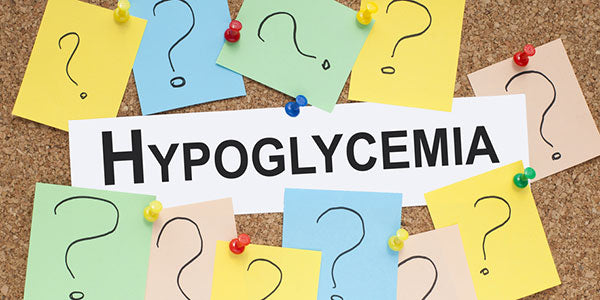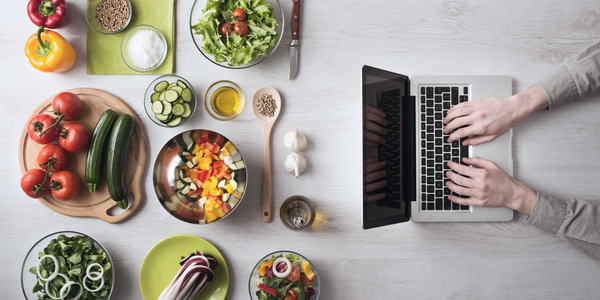
If you are experiencing an afternoon energy crisis – it could be low blood sugar. You know how it goes—it's sometime between 2pm and 3pm, and you start to lose focus on what you are doing, and a nap begins to sound more and more appealing. A little brain fog sets in. May you start staring at the computer screen while your brain is zoning out. Yep—that a clear sign of a slightly lower-than-normal blood sugar.
You're not alone, many Americans without diabetes experience "lows" sometime in the afternoon a couple hours after lunch. Mood swings are another sign that your blood sugar might be too low. Most people begin looking for an afternoon pick-me-up of coffee or some cookies, or a dose of nicotine.
The medical term for low blood sugar is hypoglycemia. But hypoglycemia that happens because of insulin resistance, or pre-diabetes – is called reactive hypoglycemia. Reactive hypoglycemia is reported most frequently by women aged 25-35 years [Garza]. But men certainly experience this phenomenon as well.
What Causes Hypoglycemia?
Usually, low blood sugar can occur following a larger dose of simple carbohydrates and sugar. Reactive hypoglycemia is essentially the crash following dessert you feel at night. It can also happen after a ‘bender' night of drinking too much alcohol. If you begin to feel shaky and/or begin sweating, feel week, tired or dizzy the next morning, it's a good indicator that you are experiencing low blood sugar, or reactive hypoglycemia, caused by the interference of alcohol with your body's natural ability to maintain a constant supply of blood sugar overnight.
Reactive hypoglycemia causes your blood sugar to drop below normal levels. But why?
What Happens When Your Blood Sugar Drops?
Your blood sugar is pretty tightly regulated. Your body uses hormones, like insulin and glucagon, to keep it locked in the right range. Insulin typically lowers your blood sugar, and glucagon will raise your blood sugar when your blood sugar supply is low.
Insulin is a fed-state hormone and tells glucose (sugar) to exit the bloodstream and enter body cells. When you eat a meal high in simple-carbohydrates – say for example, a cheeseburger with fries and a regular soda—your blood sugar will increase dramatically. As a result, your pancreas will release insulin. And lots of it.
When your body produces lots of insulin, the signal can become too strong, and as a result too much blood glucose will leave the bloodstream, causing your blood sugar to plummet. This is one of the causes of reactive hypoglycemia.
How to Fix Your Low Blood Sugar
Well, you could consume a snack or drink that contains sugar—and in people who have diabetes this is exactly what they should do. However, for someone who does not have diabetes, consuming more sugar and starchy foods will almost guarantee another crash in an hour or two. Your best bet is to consume a snack that contains protein, fiber, or a little bit of healthy fat. These do not spark a large insulin release, so you can avoid the impending crash.
You can beat these woes by eating the right snacks in between meals. Here a few ideas that will keep your brain bright and your energy sustained throughout the day.
A good rule of thumb: Keep your dose of carbohydrates at any one sitting under 15g, either from sugar or starch. This will ensure your body does not have to release too much insulin at one time, and you can avoid issues. This would be around the same amount of carbohydrates (15g) in 1 medium-sized apple.
Beat your Low Blood Sugar with These Snack Ideas:
• 2 sticks of low fat string cheese
• 1/2 an apple, sliced, with 1 tbsp of reduced fat peanut butter
• 1 oz of deli meat, rolled around a kosher pickle
• 15 almonds
• 8oz of low fat milk with 1 scoop of protein powder
• 1 5.3oz container of plain Greek yogurt sprinkled with cinnamon and stevia.
Insulin: What Happens When You Get Too Much
For people with diabetes, they already have a problem regulating blood sugar. Insulin resistance causes the body cells to respond improperly to the signals of insulin. This can be one of the causes of hypoglycemia.
But in people who don't have diabetes, reactive hypoglycemia could indicate an increased risk for developing diabetes. In women who are pregnant, gestational diabetes increases the risk of developing type 2 diabetes later in life.
People who experience reactive hypoglycemia are at risk for developing not only diabetes, but also the dreaded cardiovascular disease. So make sure you talk to your doctor and plan to reduce your intake of simple carbohydrates.
References:
Medscape article: Hypoglycemia Osama Hamdy, MD, PhD. http://emedicine.medscape.com/article/122122-overview
Garza H. Minimizing the risk of hypoglycemia in older adults: a focus on long-term care. Consult Pharm. Jun 2009;24 Suppl B:18-24. [Medline].







